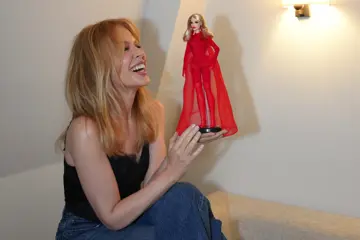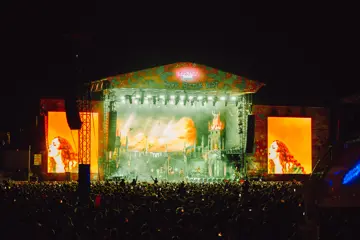 Tame Impala
Tame ImpalaWe dare you to attempt to multitask while digesting Tame Impala's magnificent fourth album, The Slow Rush. Its predecessor Currents received universal acclaim, appearing high up in the Best Of 2015 lists of many renowned media outlets and contains Tame Impala's highest-selling song to date: The Less I Know The Better. We can't help but wonder whether experiencing that level of chart-topping, award-winning success comes with a side serving of fear of failure. "Yeah, of course," musical mastermind Kevin Parker allows. "I mean, it's not so much a fear of failure, it's the fear of not doing something better than the last thing you did." Parker then admits this sort of pressure, at its worst, "can grind you to a halt". "And that's the time when I don't really like to think about music," he continues, "but when it's good pressure it's like a wave that I just have to ride out so it's not all negative."
Our first taste of The Slow Rush was Borderline, which premiered on Saturday Night Live. "It was one of the first ones that I started," Parker recounts of Borderline's creation, "because I start all of them around the same time and then finish them all around the same time - I kind of do everything at once. So by February or something last year, I'd started all the songs that were gonna be on the album, but I didn't finish writing the songs until a few hours before mastering; it's kinda funny that I do it that way."
And the version of Borderline that Tame Impala debuted on Saturday Night Live differs from the album version: "It was taken out of the oven early, in my opinion, just because we were trying to get some new music together for SNL and for Coachella." While listening to either arrangement of this song, you'll be overwhelmed by the swirling, intersecting layers of synth plus harmonies so paradisiacal that we reckon if Parker looked into his ancestry he could potentially be related to the Bee Gees. "That would be a surprise, but hey! I do love the Bee Gees," he chuckles.
Does Parker have a favourite Bee Gees song? "I mean I'm tempted to say Stayin' Alive, just because it's such a classic, but I also love this song Every Christian Lion Hearted Man [Will Show You]. Have you ever heard that? I think it's, like, late-'60s or something, but it's really amazing. Mark Ronson played it to me for the first time, actually. You've gotta check it out."
Don't miss a beat with our FREE daily newsletter
Borderline's chorus gives the impression of internal discourse ("Starting to sober up/Has it been long enough?... I'm a loser/Loosen up"), which makes us wonder whether Parker sometimes finds it hard to silence his inner critic. "That part's sorta like pretty stream-of-consciousness lyrics. But yeah, I am pretty hard on myself, and obviously I wish I wasn't, but also I reason that it's probably something that helps me, in a way."
You can tell by his compositions that Parker is a perfectionist. He's been quoted as saying, "Part of the thing about me starting an album is that I have to feel kind of worthless again to want to make music." When asked how he gets himself into that frame of mind, Parker clarifies, "I mean, it's not worthless like some people feel worthless - it's not like depression or anything; depression isn't creative for anyone. It's just feeling shit about yourself in the kind of day-to-day ups and downs. When I'm feeling good, things don't come to me the way they do when I'm just feeling like, 'I need something in my life right now to make me feel better,' and it just so happens that coming up with a new song makes me instantly feel better about myself. In a way, it's the only thing that can make me feel the best that I can. It covers everything for me. It ticks all the boxes. It makes me feel confident with myself and also that I've still got it," he laughs. "That I haven't lost it, you know?
"Because after every song that I write there's always the fear - it's not like the fear is always there, but every song I write could be my last good song. Like, 'Hey, this could be the last good song I ever write!' Because maybe one day, surely, that'll be the case, you know? Like, Paul McCartney doesn't write songs like he used to and Stevie Wonder doesn't write songs like he used to so, at some point, that day is gonna come, I feel."
If you can listen to Posthumous Forgiveness while reading the lyric sheet without welling up, your tear drainage system must be on the blink. The deeply personal third single to be lifted from The Slow Rush sees Parker addressing his late father, who passed away in 2009 (before the release of Tame Impala's debut album). After his parents divorced when he was just four, Parker lived with his mother while his brother grew up with his father. His mum and dad got back together years later, reuniting the whole family under one roof, before breaking up again.
"And you could store an ocean in the holes/In any of the explanations that you gave/And while you still had time, you had a chance/But you decided to take all your sorrys to the grave" - it's a devastating listening experience with harrowing lyricism offset by elegiac synths, sauntering bass and considered drumming.
On whether this is the most personal song he's ever written, Parker ponders, "All my songs are personal in some way. I guess it's the most 'heart on my sleeve' kinda thing [I've done]; I didn't intend for it to be that, it kind of just felt right to sing about and to sing those lyrics. But, the thing is, I don't want people to think that that's how I feel about my dad every day. Because it's not; it's how I have felt before for the sake of making a song that I feel is moving, which is all I care about doing at the end of the day - I just wanna make music that's moving, whether it's in a happy way or a darker way or somewhere in between."
When asked whether this song felt cathartic to write and helped him find some sort of peace while reflecting on his relationship with his estranged dad, Parker hesitates, "I mean it's complicated, obviously, but every little bit helps, you know."
Probably the section that most affected this scribe goes down in the second half of the song, which changes tack and sees Parker wishing his father was still around to witness all that he's achieved through music. Singing in that trademark crestfallen-yet-hopeful falsetto, Parker sounds like a little lost lamb on an islet torn away from the coast, helplessly floating away from his flock: "Wanna tell you about the time/I was in Abbey Road/Or the time that I had/Mick Jagger on the phone."
So how did this genuine anecdote, which resulted in Parker remixing Jagger's Gotta Get A Grip, go? "I think he said he was a fan, that he liked the music or something. But he was just talkin' about what he'd been doing; he was just watching the cricket with his kids or something - I think he was in Paris at the time. We just chatted about what he'd been doing with his solo stuff, but he was super nice."
Other artists that have sought Parker out for collaborations include Ronson, Lady Gaga, Kanye West, Kali Uchis, Travis Scott and The Flaming Lips. For someone who has experienced so much success - through Tame Impala, as a collaborator and also a producer - Parker somehow manages to avoid public scrutiny and protect his privacy. "I think as an artist you kind of carve out the world you want for yourself," he opines. "If you want your personal life to be on display and something that everyone talks about you can have that. And a side effect from that is that you probably get photographers showing up at your door. But I like to keep it pretty mysterious."















